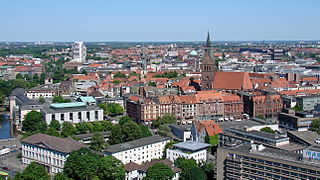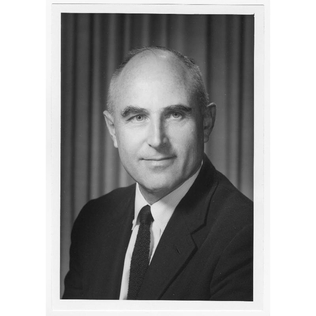
Hanover is the capital and largest city of the German state of Lower Saxony. Its 535,932 (2021) inhabitants make it the 13th-largest city in Germany as well as the fourth-largest city in Northern Germany after Berlin, Hamburg and Bremen. Hanover's urban area comprises the towns of Garbsen, Langenhagen and Laatzen and has a population of about 791,000 (2018). The Hanover Region has approximately 1.16 million inhabitants (2019).

The Club of Rome is a nonprofit, informal organization of intellectuals and business leaders whose goal is a critical discussion of pressing global issues. The Club of Rome was founded in 1968 at Accademia dei Lincei in Rome, Italy. It consists of one hundred full members selected from current and former heads of state and government, UN administrators, high-level politicians and government officials, diplomats, scientists, economists, and business leaders from around the globe. It stimulated considerable public attention in 1972 with the first report to the Club of Rome, The Limits to Growth. Since 1 July 2008, the organization has been based in Winterthur, Switzerland.
The World3 model is a system dynamics model for computer simulation of interactions between population, industrial growth, food production and limits in the ecosystems of the earth. It was originally produced and used by a Club of Rome study that produced the model and the book The Limits to Growth (1972). The creators of the model were Dennis Meadows, project manager, and a team of 16 researchers.

Gottfried Wilhelm Leibniz University Hannover, also known as the University of Hannover, is a public research university located in Hanover, Germany. Founded on 2 May 1831 as Higher Vocational School, the university has undergone six periods of renaming, its most recent in 2006.

The Technische Universität Darmstadt, commonly known as TU Darmstadt, is a research university in the city of Darmstadt, Germany. It was founded in 1877 and received the right to award doctorates in 1899. In 1882, it was the first university in the world to set up a chair in electrical engineering. In 1883, the university founded the first faculty of electrical engineering and introduced the world's first degree course in electrical engineering. In 2004, it became the first German university to be declared as an autonomous university. TU Darmstadt has assumed a pioneering role in Germany. Computer science, electrical engineering, artificial intelligence, mechatronics, business informatics, political science and many more courses were introduced as scientific disciplines in Germany by Darmstadt faculty.
Jack Leo Van Impe was an American televangelist known for his half-hour weekly television series Jack Van Impe Presents, an eschatological commentary on the news of the week through an interpretation of the Bible. The program airs around the world through both religious broadcasters and the purchase of paid programming time on commercial television stations. He was known as the "Walking Bible", having memorized most of the King James Version of the Bible. His wife, Rexella, shared his television ministry as co-host.

The Technische Universität Braunschweig, commonly referred to as TU Braunschweig, is the oldest Technische Universität in Germany. It was founded in 1745 as Collegium Carolinum and is a member of TU9, an incorporated society of the most renowned and largest German institutes of technology. It is commonly ranked among the top universities for engineering in Germany. TU Braunschweig's research profile is very interdisciplinary, but with a focus on aeronautics, vehicle engineering including autonomous driving and electric mobility, manufacturing, life sciences, and metrology. Research is conducted in close collaboration with external organizations such as the German Aerospace Center, Helmholtz Centre for Infection Research, several Fraunhofer Institutes, and Germany's national metrology institute (PTB), among many others. As one of very few research institutions of its type in the world, the university has its own research airport.

Rita Süssmuth is a German politician of the Christian Democratic Union (CDU). She served as the 10th President of the Bundestag.
The Gottfried Wilhelm Leibniz Prize, in short Leibniz Prize, is awarded by the German Research Foundation to "exceptional scientists and academics for their outstanding achievements in the field of research". Since 1986, up to ten prizes are awarded annually to individuals or research groups working at a research institution in Germany or at a German research institution abroad. It is considered the most important research award in Germany.

Roland Rainer was an Austrian architect.

Ascher Herman Shapiro was a professor of Mechanical Engineering at MIT. He grew up in New York City.
Mihajlo D. Mesarovic is a Serbian scientist, who is a professor of Systems Engineering and Mathematics at Case Western Reserve University. Mesarovic has been a pioneer in the field of systems theory, he was UNESCO Scientific Advisor on Global change and also a member of the Club of Rome.

TU9 German Universities of Technology e. V. is the alliance of nine leading Technical Universities in Germany. The current president of TU9 is Wolfram Ressel, rector of the University of Stuttgart.
Boris Rajewsky was a Russian-born German biophysicist, who was one of the most influential researchers on the impact of radiation on living organisms in the 20th century. He served as Rector of the Goethe University Frankfurt from 1949 to 1951.

Erich Barke is a German emeritus professor of microelectronics. From 2005 to 2014, he was president of the Gottfried Wilhelm Leibniz Universität Hannover. Until December 2014, he was also president of the Niedersächsische Technische Hochschule (NTH).
Hermann Bahlsen was a German entrepreneur in the food industry as well as the inventor of the Leibniz butter biscuit and founder of the Bahlsen confectionery factory.

Ulrich Reimers is an electrical engineer and is regarded as a pioneer of digital television. The International Electrotechnical Commission (IEC) elected him for its Hall of Fame of most important personalities.
Alexander L. Yarin is a Soviet-Israeli-American applied physicist and engineer, from 2006 and currently Distinguished Professor at University of Illinois, Chicago and an Elected Fellow of the American Physical Society.
Eduard Arzt is an Austrian physicist and materials scientist. He is the recipient of the Gottfried Wilhelm Leibniz Prize, the highest research award of the German Research Foundation (DFG), the Acta Metallurgica Award, and the Heyn-Award, the highest award of the German Materials Society (DGM). He is a member of the German Leopoldina Academy of Sciences in Halle, and a corresponding member of the Austrian Academy of Sciences in Vienna. In 2020, Arzt was elected an international member of the US National Academy of Engineering











